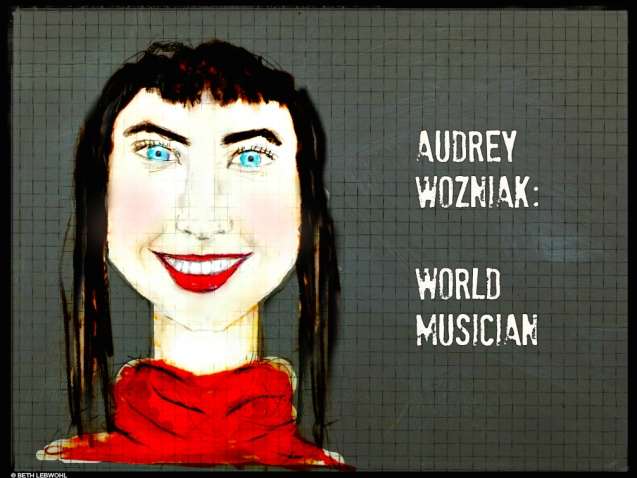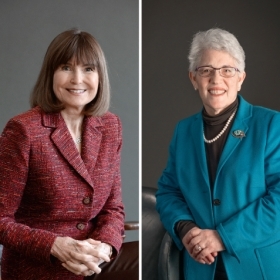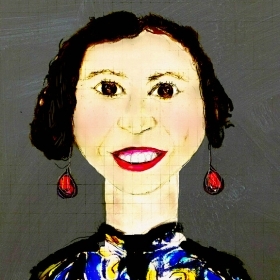Audrey Wozniak ’14 currently studies global affairs at the London School of Economics. But she is, first and foremost, an accomplished violinist. “What makes music enjoyable for me is the act of individual and collective expression in the context of other musicians,” she says. That’s why, when Wozniak was awarded a prestigious Watson Fellowship to study traditional music around the world in 2014–15, her journey centered on fellow musicians. She spoke with Wellesley magazine about her global adventures over the past year.
Last year, you studied in Bali, Indonesia, with Pak Sanglah, a master of a traditional stringed instrument called the rebab. What was that like?
In Bali, the rebab is a bowed instrument typically made of mahogany wood and two low-tension steel strings. The instrument sounds like a cat in pain, and I was not very taken with it when Sanglah first started teaching it to me. But he and I would sit on the floor in his open-air workshop for hours, repeating the same melodies on the rebab over and over.
This exercise was so frustrating—the tunings and melodies were unfamiliar, my back was aching from sitting cross-legged, and I couldn’t perceive any progress. Yet Sanglah was militantly positive, telling me how blessed we were to have good families, good friends, music in our lives, and fresh fruit juice from his trees.
After a while, so much started to click for me. Balinese music, with its slow development over the course of many repetitions, really highlights the pace of life in Bali. And what Sanglah relayed to me about both music and life was the phrase he had handwritten on the back of each of his hundreds of business cards:
SUCCESS IS GOOD
HAPPY IS BETTER
IF YOU WANT BE HAPPY
BE HAPPY NOW
You met another great soul: cellist Yo-Yo Ma. During your year as a Watson Fellow, you toured with him and the Silk Road Ensemble in China for two weeks. How did it feel to play with such a renowned musician?
Yo-Yo is, of course, a mind-blowingly amazing cellist. On the tour, however, what struck me is that he is a true cultural ambassador. He is funny, humble, and genuine, and has that ability that great diplomats have of making people feel connected and included, regardless of who they are. For instance, when we were parting ways at the end of the tour, Yo-Yo said to me jokingly and with affection, “Audrey, thank you for joining us on this tour. Please stay in touch! Do I need to worry about you?” I assured him my mother already does plenty of that.
You also studied in Turkey and explored what’s known as Black Sea music. How did that happen?
I was completely entranced after hearing a Black Sea musician on the street in Istanbul. I went to meet with him for many days to try to catch on to what he was playing on the kemençe, a three-stringed instrument that is huge part of that music. The base melodies aren’t inherently that difficult, but they take on a life of their own in Black Sea music because of the wildly complex rhythms. The music is really longing and bewitching, and, even as someone who hasn’t lived [near] or even visited the Black Sea, listening to that music I still experienced a sense of nostalgia for the mountains by the sea.
When you talk about your musical encounters over the past year, the stories often involve men. That’s no accident, is it?
In most of the places I spent time, there is a legacy—if not a current culture—of women being prohibited from playing certain instruments (and, of course, traveling alone). As a foreigner (and, in particular, as a white American with blue eyes), I was given a “free pass” with regard to many of the cultural limitations imposed on local women. While I still have moral quandaries about that, it was a blessing for my project. For instance, when I was in western China, a professor invited me to watch his all-male band’s rehearsal of traditional Uyghur folk music and, afterwards, invited me to an extravagant toast-filled baijiu drinking party (this, in a culture where alcohol consumption is a social taboo, especially for women).
Still, the popular notion that American women are “loose” and “easy” dogged me everywhere I went, and I found myself having to constantly set clear professional boundaries with the male musicians I was trying to learn from.
You say you discovered that music is not really a “universal language.” What do you mean by that?
It was incredible to hear people from disparate places (without any prompting from me!) articulate their understanding of musical traditions using the same vocabulary they use to talk about language use and variation. For example, my erhu teacher in Hong Kong told me I could only really play Cantonese music when I learned how to curse like a Cantonese person! While local musical traditions may not be universally understood, hearing musicians compare music to language again and again affirmed how fundamental music is as a tool of self-expression around the world.
You currently study global politics at the London School of Economics. How does music inform that experience?
The process of making music—and particularly improvising—with others is a useful way of understanding how to facilitate successful international collaborations. Before you can play with other musicians, you have to listen to how they play before asserting your own interpretation.
You can read more about Audrey’s adventures at audreywoz.com.
Part II in a series about alumnae whose lives and work take them around the world. Read Part I, about Veronica Ades ’99, here.







We ask that those who engage in Wellesley magazine's online community act with honesty, integrity, and respect. (Remember the honor code, alums?) We reserve the right to remove comments by impersonators or comments that are not civil and relevant to the subject at hand. By posting here, you are permitting Wellesley magazine to edit and republish your comment in all media. Please remember that all posts are public.